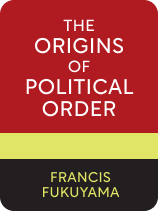

This article is an excerpt from the Shortform book guide to "The Origins of Political Order" by Francis Fukuyama. Shortform has the world's best summaries and analyses of books you should be reading.
Like this article? Sign up for a free trial here.
Is there a “recipe” for democratic government? Is democracy contingent? Can political decay be reversed?
To understand the pressures on democracy in the 21st century, it’s important to understand what modern democracy is and where it came from. Francis Fukuyama aims to build that foundation in his book The Origins of Political Order.
Continue reading for the book’s takeaways on understanding democracy in the world today.
Understanding Democracy
The Origins of Political Order, by Francis Fukuyama, explores the development of political systems from prehistory to the eve of the American and French revolutions in the late 18th century. Fukuyama is interested in how and why contemporary liberal democracies emerged. He argues that there are three main components of a stable democratic society:
- A strong state capable of wielding military power, collecting taxes, and enforcing laws.
- The rule of law—the belief in an ordering principle higher than the state itself by which the state must abide if it’s to remain legitimate.
- Accountability, which means that a state respects the rights and needs of its citizens, to whom it must ultimately answer.
Fukuyama begins by suggesting that understanding the three pillars will help us foster modern democracies. But, in the end, the book is more of an analytical description of political history than a practical prescription for political action. In fact, given how complex Fukuyama shows political evolution to be, it seems unlikely that we could ever devise a “recipe” for democratic government.
Still, the book offers a few lessons that can add to our understanding of foreign policy and domestic politics—and, hopefully, guide policymakers to the best possible decisions. We’ll explore these takeaways for understanding democracy while counterbalancing Fukuyama’s often optimistic views on political development with the more skeptical opinions of some of his critics.
Takeaway #1: Democracy Is Contingent
One of Fukuyama’s key ideas is that modern democracy is contingent on the existence of specific conditions that allow the three pillars to develop. For Fukuyama, this contingency is good news because it means that the road to modern democracy is always open. He stresses that each of the three pillars has evolved independently in different cultures at different times in history. This implies that there’s no one blueprint for attaining modern democracy and that any culture can get there given the right conditions.
(Shortform note: On the other hand, some reviewers find Fukuyama’s optimism unconvincing, arguing that what the book really proves is that modern democracy requires a lot of lucky breaks that make it next to impossible to deliberately build a democratic system. For example, one reviewer contends that Fukuyama’s analysis is circular in that it claims that English democracy emerged because England already had democratic tendencies. Likewise, another reviewer complains that Fukuyama fails to explain how to actually get from a dysfunctional government to a functional one except by not being dysfunctional in the first place.)
Takeaway #2: The State Must Precede Democracy
For democracy to succeed, Fukuyama says, a country first needs to develop a strong central state that can enforce order, provide vital services (such as infrastructure and education), and forge a coherent sense of national identity. He notes that it’s typically a bad idea to transplant democratic systems into societies that haven’t already evolved a strong state. Doing so creates more problems than it solves: Without a strong state, transplanted democracies tend to result in corruption and clientage (the exchange of political favors for money or goods). This happens because without a strong pre-existing state, elected officials often continue tribal patterns of behavior, which encourage funneling resources to one’s own group.
(Shortform note: It’s unclear what exactly we should do with the observation that a strong state is a necessary precursor to democracy. One lesson we can draw is that tampering in other countries’ politics in an attempt to spread democracy is counterproductive at best. Still, as one reviewer points out, in places where the population wishes to replace a dysfunctional or exploitative government with a democratic system, waiting for a stronger state isn’t necessarily a viable option.)
Takeaway #3: Political Systems Can Decay
Though well-established political systems of all types (democratic or otherwise) often appear stable, Fukuyama notes that there’s always the danger of political decay and collapse. Decay can happen when political institutions fail to keep up with changing social and economic conditions or when familial, tribal, or factional interests gain more power or influence than the state itself. For example, centuries after China created its bureaucratic state (between 770-256 BC), kinship-based organization gradually reasserted itself as individual aristocrats began hoarding political power among their own families. This trend culminated in the collapse of the empire (from AD 220-581) and a return to localized, decentralized rule instead of a state.
| How to Reverse Political Decay While Imperial China’s political collapse was, in effect, a reversion to a previous form of social order, a similar upsurge of factional interests can happen even in societies that lack a strong tribal or kinship tradition. For instance, in Political Order and Political Decay, Fukuyama explains that until the end of the 19th century, the US lacked strong central authority and was dominated by corrupt local politics based on bribery and clientage. Though the country went through a series of reforms and modernizations in the 20th century, Fukuyama warns that in the 21st century, lobbies, interest groups, and congressional factionalism have gradually eroded the government’s effectiveness—and the public’s faith in their leaders. Unfortunately, there’s no clear answer to these problems, though experts have offered a wide range of suggestions. As far as US politics, some analysts recommend banning lobbyist fundraising and preventing former politicians from joining lobbies, whereas others suggest funding more diverse interest groups in order to balance out the primarily corporate interests that currently dominate politics. Meanwhile, observers have sought to end congressional gridlock with solutions ranging from ending the filibuster to changing the way elections work. Improving any political system will likely remain a process of trial and error. But if Fukuyama is right about political decay—and a 2021 study showing that democracy is under greater threat than ever before suggests he is—it seems certain that countries wishing to preserve their democracies need to do something. |

———End of Preview———
Like what you just read? Read the rest of the world's best book summary and analysis of Francis Fukuyama's "The Origins of Political Order" at Shortform.
Here's what you'll find in our full The Origins of Political Order summary:
- What modern democracy is and where it came from
- The three components a stable democratic society requires
- Three important takeaways from Fukuyama's book






